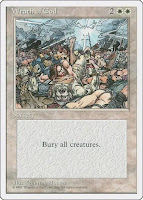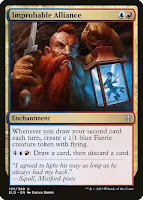One of the earliest things we learn in our foray into competitive Magic is to not play around cards we cannot beat. If you are at 3 life and your opponent attacks their 2/2 into your 3/3, you always block because, if you play around a pump spell by not blocking, they cast the pump spell on their 2/2 and you lose. Another example: your aggro deck has 6 power on the board and you just attacked your control opponent to 8. If your last card in hand is a 2/2 you should play it, because if the opponent casts Wrath of God effect next turn you are losing anyway, even if you hold the 2/2.
The reason we use these examples to teach this concept is that they reduce the concept to very simple terms. In the event the opponent does have the card we’re worried about, regardless of the choice we make we clearly lose the game on the spot. Literally on the spot, in the case of the pump spell example; in the Wrath example, our win percentage is reduced to ~0% on the spot, even if the game may continue for several more turns. Both examples occur in the very late stages of the game. But to maximize our chance of winning, we can’t wait until the final turns of a game; we always need to be on the lookout for these cases. These situations occur all the time, as early as the first turn.
Example #1:
You’re playing Murktide in Modern against 4C Beanstalk Omnath. Your opponent is on the play and has kept 7 cards. You mulligan to 6. Your opponent plays a fetchland and passes (presumably to fetch a Triome on your end step). You draw for your first turn and your hand consists of lands, Ragavan, Consider, Counterspell, and Expressive Iteration. The question: whether to hold up Consider or cast turn 1 Ragavan into a possible Wrenn and Six, which, if the opponent has it, will likely win them the game on the spot.
In this situation, I cast Ragavan. If you don’t cast the Ragavan you’ll still likely lose to Wrenn if the opponent has it, and now you’ll lose to most non-Wrenn draws too. For example, what if their 2-drop is Beanstalk instead of Wrenn? Now you can’t pressure them and they’ll grind you out. Even if the opponent is around 50% to cast Wrenn and, say, 80% to win if they immediately kill your Ragavan (i.e., you’re 40% to lose the game right away if you cast the Ragavan), your win percentage is even lower if you pass the turn. It’s tempting to hold up Consider, but I don’t think this is a winning play.
Example #2:
I remember a few years ago I was prepping for one of the Arena Pro Tours, the Strixhaven Championship. Our team was pretty set on Phoenix, but in the final day or two of testing Jeskai Control emerged as a dark horse. We were interested in Jeskai in part because it had a great Phoenix matchup. It had cards like Anger of the Gods and Rest in Peace to stop the Phoenixes and plenty of cheap removal and counters for the other threats. From the Phoenix side, we were trying out Improbable Alliance as a threat that could dodge the removal of the control deck. (Spoiler alert: we determined Alliance wasn’t reliable enough and didn’t end up playing it. We also determined Phoenix was too strong in general and so we dismissed Jeskai.)
I was watching a teammate test Phoenix against Jeskai. I can’t recall the exact hands, but I remember it was the Phoenix player’s turn 2 on the draw, it was post-sideboard, and the Jeskai deck had 2 mana up, representing one of 7 counterspells they could cast here (Dovin’s Veto or Mystical Dispute). The Phoenix player played their second land and their hand was several cantrips and an Improbable Alliance. The question was: should they play the Improbable Alliance into a likely counter, thus leaving them with zero threats, or should they play around a counter by instead playing a couple of 1-mana cantrips? The player elected to cast the cantrips. I didn’t think much of the play in the moment, but I remember Matti Kuisma and Sam Rolph (two extremely strong players) butting in that they’d have cast the Alliance.
Reflecting on it, I think casting Alliance was clearly the correct play. It feels very bad to slam your only threat into a likely counter, significantly reducing your chances of winning the game on the spot if they have it. But the overall situation (and the matchup) was too bad to play passively; even if the opponent was, say, 65% to have a counter, spending your early turns casting cantrips instead of trying to pressure the control opponent is a recipe for a very likely loss. Moreover, Veto is impossible to play around: it is a hard counter that you cannot interact with, even if you were to find a counter of your own. Given your hand and given the matchup, you need to try and steal this game, so you should take your ~35% shot to put a sticky threat onto the board and try to ride it to victory. In fact, while 35% sounds bad, that number gets even worse as the game progresses, as the Jeskai player sees more cards and has more chances to find a counter.











